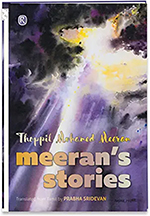Vappa means father and Umma means mother in the dialect used by Tamil-speaking Muslims. Here is a book filled with Vappas, Ummas, Moothummas (Grandmas), and Moothappas (Grandpas). The book Meeran’s Stories has eighteen short stories written by Sahitya Akademi award-winning Thoppil Mohamed Meeran (1944-2019). He won the award in 1997 for the novel Saivu Narkali (The Reclining Chair). Prabha Sridevan, the translator, has taken care to see that the original flavour of the narrative is not lost in translation. The stories talk of greed that alienates individuals, neglect of the elderly, unfulfilled wishes, dwindling of compassion, and lack of gratitude. The dark stories have shades of patriarchy, and value judgment built into them. They convey the subjective biases of the narrator. Meeran is a lover of nature, children, and memories. A keen observer of contemporary society he laments the limitations of middle-class lives and cribs about the hypocrisies of people. Most of the stories leave you with a heavy heart. That is perhaps where the author triumphs.
Meeran is a social reformer among writers. He is one of the early voices against the misuse of triple talaq by Muslim men. One of his short stories, ‘Karavai Theerntha Maadu’ (not in this book) is a masterpiece of ‘empathetic storytelling’. It is about how a man abuses the system of triple talaq to divorce his wife who has fallen sick.
Meeran started writing in little magazines like Madinah that were circulated among Tamil-speaking Muslim communities in the 1980s. By his near-accurate depiction of the Muslim community in the southern Tamil Nadu district of Kanyakumari, he has been reckoned as a ‘force for good’ in the community. His story ‘Calendar Bawa’ is a satirical take on the unscientific ways of sighting the crescent moon at the beginning of the holy month of Ramadan. He always has a no-nonsense take on the social situation. His capacity to catch up with the ever-changing nature of communities and their aspirations is captured in the narrative of the short story ‘Why Life Ebbed out of Kamatchi Nagar?’.
Meeran’s is a creative soul that sorrows the losses of our trees, lakes, rocks, hillocks, birds, and forests. Human-driven destruction of nature is a recurring theme in his short stories and novels. He is a character in most of his short stories. He reveals himself as a wronged father. He manifests himself as a wronged wife. He travels the minds of the wronged humans through his endless conversations with them. He has been a wholesale dealer of chilli and was dependent on it for his livelihood. He published his first novels on his own. He has seen himself as a great advocate of a life led by compassion in a world devoid of love. He expresses his weaknesses in this world through some of the characters in his writings. The author does not disappoint the reader when he applies elements of fantasy in stories like ‘Abdullah Ibnu Abubakker’.

